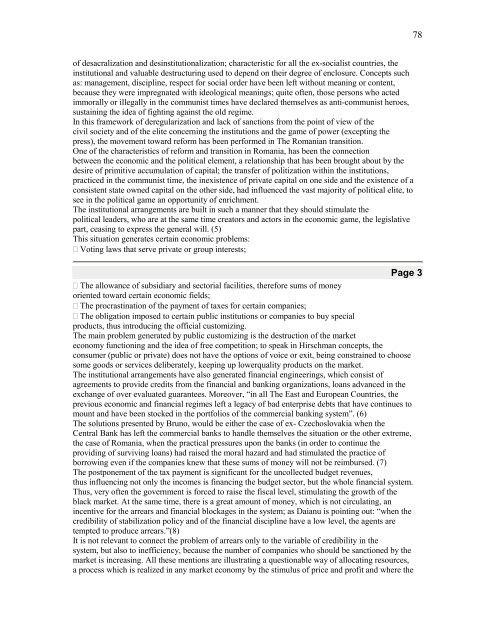FILSAFAT KORUPSI - Direktori File UPI
FILSAFAT KORUPSI - Direktori File UPI
FILSAFAT KORUPSI - Direktori File UPI
Create successful ePaper yourself
Turn your PDF publications into a flip-book with our unique Google optimized e-Paper software.
of desacralization and desinstitutionalization; characteristic for all the ex-socialist countries, the<br />
institutional and valuable destructuring used to depend on their degree of enclosure. Concepts such<br />
as: management, discipline, respect for social order have been left without meaning or content,<br />
because they were impregnated with ideological meanings; quite often, those persons who acted<br />
immorally or illegally in the communist times have declared themselves as anti-communist heroes,<br />
sustaining the idea of fighting against the old regime.<br />
In this framework of deregularization and lack of sanctions from the point of view of the<br />
civil society and of the elite concerning the institutions and the game of power (excepting the<br />
press), the movement toward reform has been performed in The Romanian transition.<br />
One of the characteristics of reform and transition in Romania, has been the connection<br />
between the economic and the political element, a relationship that has been brought about by the<br />
desire of primitive accumulation of capital; the transfer of politization within the institutions,<br />
practiced in the communist time, the inexistence of private capital on one side and the existence of a<br />
consistent state owned capital on the other side, had influenced the vast majority of political elite, to<br />
see in the political game an opportunity of enrichment.<br />
The institutional arrangements are built in such a manner that they should stimulate the<br />
political leaders, who are at the same time creators and actors in the economic game, the legislative<br />
part, ceasing to express the general will. (5)<br />
This situation generates certain economic problems:<br />
Voting laws that serve private or group interests;<br />
Page 3<br />
The allowance of subsidiary and sectorial facilities, therefore sums of money<br />
oriented toward certain economic fields;<br />
The procrastination of the payment of taxes for certain companies;<br />
The obligation imposed to certain public institutions or companies to buy special<br />
products, thus introducing the official customizing.<br />
The main problem generated by public customizing is the destruction of the market<br />
economy functioning and the idea of free competition; to speak in Hirschman concepts, the<br />
consumer (public or private) does not have the options of voice or exit, being constrained to choose<br />
some goods or services deliberately, keeping up lowerquality products on the market.<br />
The institutional arrangements have also generated financial engineerings, which consist of<br />
agreements to provide credits from the financial and banking organizations, loans advanced in the<br />
exchange of over evaluated guarantees. Moreover, “in all The East and European Countries, the<br />
previous economic and financial regimes left a legacy of bad enterprise debts that have continues to<br />
mount and have been stocked in the portfolios of the commercial banking system”. (6)<br />
The solutions presented by Bruno, would be either the case of ex- Czechoslovakia when the<br />
Central Bank has left the commercial banks to handle themselves the situation or the other extreme,<br />
the case of Romania, when the practical pressures upon the banks (in order to continue the<br />
providing of surviving loans) had raised the moral hazard and had stimulated the practice of<br />
borrowing even if the companies knew that these sums of money will not be reimbursed. (7)<br />
The postponement of the tax payment is significant for the uncollected budget revenues,<br />
thus influencing not only the incomes is financing the budget sector, but the whole financial system.<br />
Thus, very often the government is forced to raise the fiscal level, stimulating the growth of the<br />
black market. At the same time, there is a great amount of money, which is not circulating, an<br />
incentive for the arrears and financial blockages in the system; as Daianu is pointing out: “when the<br />
credibility of stabilization policy and of the financial discipline have a low level, the agents are<br />
tempted to produce arrears.”(8)<br />
It is not relevant to connect the problem of arrears only to the variable of credibility in the<br />
system, but also to inefficiency, because the number of companies who should be sanctioned by the<br />
market is increasing. All these mentions are illustrating a questionable way of allocating resources,<br />
a process which is realized in any market economy by the stimulus of price and profit and where the<br />
78

















